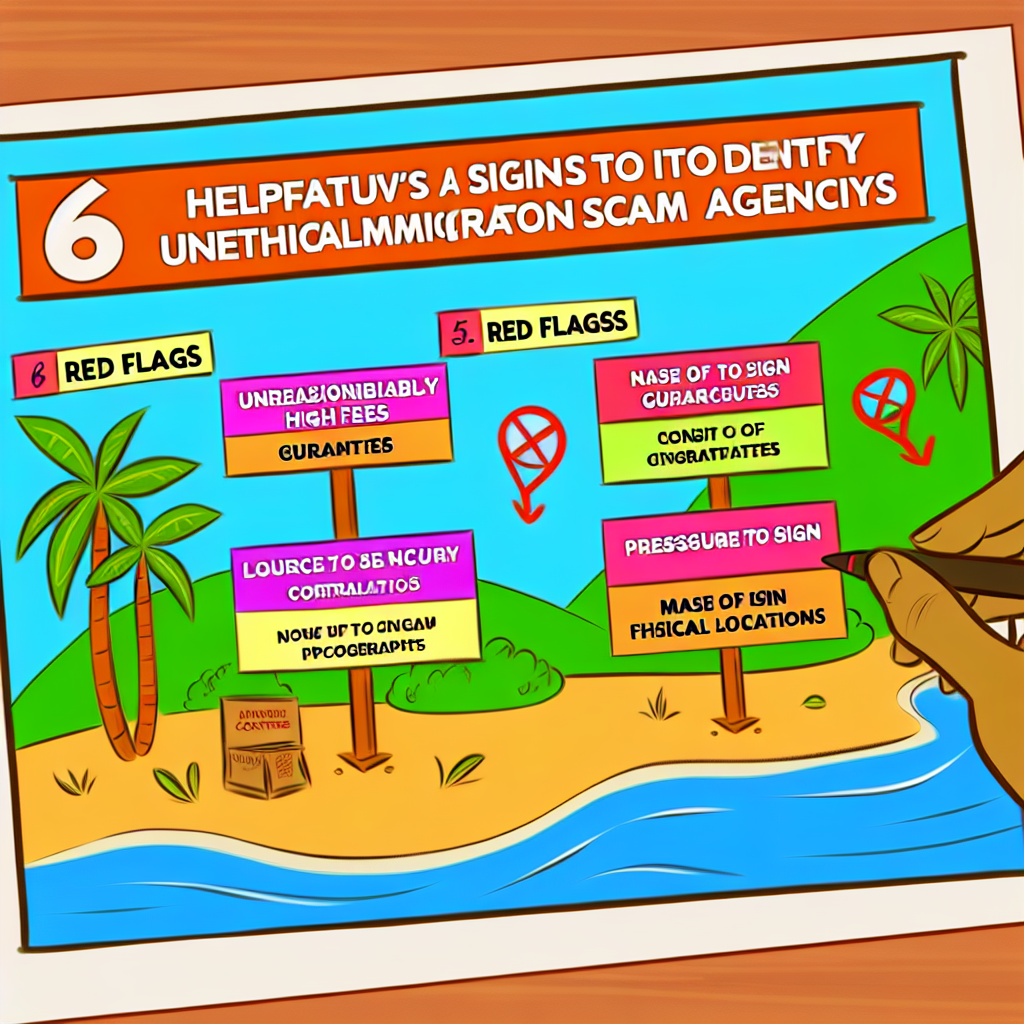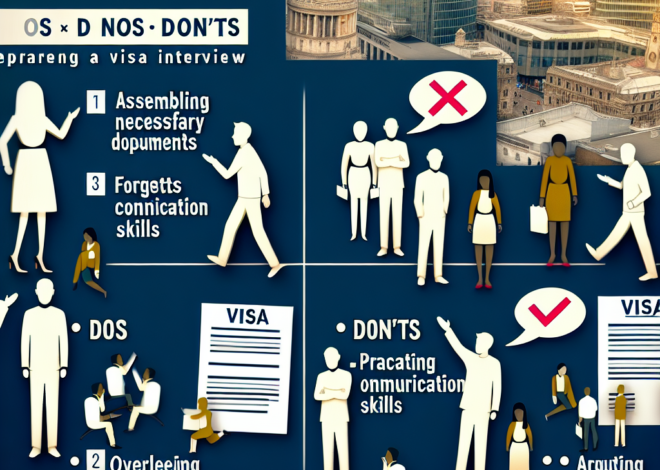
6 signs to detect immigration scam agencies
-
Table of Contents
“Spot the Scam: 6 Red Flags to Identify Fraudulent Immigration Agencies”
Introduction
Immigration scams can be a significant obstacle for individuals seeking to move or travel to another country. Fraudulent agencies exploit the complexity of immigration procedures to deceive applicants, often resulting in financial loss and dashed hopes. Recognizing the signs of such scams is crucial for anyone looking to navigate the immigration process safely. Here are six key indicators that an agency might be involved in deceptive practices, helping potential immigrants identify and avoid fraudulent entities.
Recognizing Red Flags: 6 Signs of Immigration Scam Agencies
In the pursuit of a new life or career opportunities abroad, many individuals turn to immigration agencies for assistance in navigating the complex processes involved. However, amidst genuine facilitators, scam agencies lurk, preying on the hopes of unsuspecting clients. Recognizing the red flags associated with such fraudulent entities can save potential immigrants time, money, and unnecessary heartache.
Firstly, one of the most glaring signs of a scam is the guarantee of success. Immigration procedures vary by country and involve stringent legal criteria; no agency can legitimately promise a successful outcome. If an agency claims it can guarantee visa approval or expedite the process through exclusive contacts within immigration departments, it is likely misleading and potentially fraudulent.
Secondly, transparency in billing practices is another crucial aspect to consider. Scam agencies often feature vague details about fees or reveal hidden costs after securing a client’s commitment. A reputable agency will provide a detailed contract upfront, outlining all charges and conditions clearly. If an agency is not upfront about costs or pressures you to pay before providing detailed service agreements, it is advisable to approach with caution.
Moreover, the absence of a physical address or verifiable contact information can also be a red flag. While many legitimate businesses operate online, a credible immigration agency will have a physical office or at least a postal address and verifiable phone numbers. Agencies that only provide a website or an email address, without any way to verify their physical presence, should be approached skeptically.
Additionally, the credentials of the agency and its consultants are paramount. In many countries, immigration consultants must be licensed or certified by a recognized regulatory body. Scam agencies often lack such credentials or may display fake or outdated licenses. Prospective clients should verify these credentials independently by checking with the relevant regulatory authorities.
Another warning sign is the lack of personalized services. Immigration applications often require careful consideration of individual circumstances. Scam agencies tend to offer one-size-fits-all solutions, without considering the unique aspects of each client’s case. This approach not only shows a lack of professionalism but also significantly diminishes the chances of a successful application.
Lastly, high-pressure sales tactics should raise suspicions. Scam agencies often create a sense of urgency, claiming that immigration laws are about to change and fast action is needed to secure a spot. They might also offer special discounts for signing up immediately. Such tactics are designed to rush individuals into making decisions without proper consideration and should be recognized as a major red flag.
In conclusion, while the dream of immigrating can be powerful, it is important to approach the process with caution and due diligence. By being aware of these six signs—guarantees of success, unclear billing practices, lack of physical presence, unverified credentials, non-personalized services, and high-pressure sales tactics—prospective immigrants can protect themselves from falling victim to scam agencies. Always take the time to research thoroughly and choose an agency that upholds the highest standards of honesty and professionalism.
Stay Safe: Identifying 6 Common Tactics Used by Fraudulent Immigration Agencies
In the pursuit of dreams and opportunities abroad, many individuals turn to immigration agencies for assistance. However, amidst genuine facilitators, there lurk fraudulent entities preying on the hopes of unsuspecting clients. Recognizing the signs of such scams is crucial to safeguard one’s aspirations and resources. Here, we explore six common tactics used by deceitful immigration agencies, helping you stay vigilant and secure.
Firstly, one of the most glaring red flags is the guarantee of a job or visa. Legitimate agencies understand that the approval of visas and job offers are subject to the regulations and decisions of respective authorities and cannot be guaranteed. Scammers often lure clients with promises of guaranteed employment or visa issuance, playing on their desperation and urgency. If an agency makes such guarantees, it is advisable to approach with caution and verify their claims thoroughly.
Secondly, transparency in fee structure is a hallmark of reputable service providers. Fraudulent agencies often have hidden costs or ask for full payment upfront, sometimes under the guise of securing a position or speeding up the process. It is important to ensure that all fees are clearly outlined and justifiable. A legitimate agency will provide a detailed account of all charges, and payments are typically staggered rather than demanded in one lump sum.
Moving on, the absence of a physical address or verifiable contact information can also be indicative of a scam. A credible agency will have a physical office and an established means of communication. Scammers often operate solely online and may provide only a vague location or none at all. Before engaging services, it is wise to conduct a site visit or verify the listed address through additional online research.
Furthermore, the presence of high-pressure sales tactics is another warning sign. Scammers often create a sense of urgency, pushing clients to make quick decisions by claiming limited-time offers or impending policy changes. This tactic is designed to prevent potential clients from conducting thorough research or seeking second opinions. Legitimate agencies provide ample time for decision-making, encouraging clients to fully understand the process.
Additionally, a lack of proper credentials or affiliations can signal trouble. Reputable immigration consultants are typically registered with a regulatory body or association which governs their operations and ensures adherence to ethical standards. Fraudulent agencies might boast of affiliations that are either non-existent or irrelevant to immigration services. It is crucial to verify such credentials by checking with the respective regulatory bodies.
Lastly, client testimonials and reviews can provide insightful perspectives on the agency’s operations. While every business may have some negative reviews, consistent patterns of complaints regarding overcharges, poor communication, or unfulfilled promises should raise concerns. Engaging with previous clients or checking online forums and review platforms can provide additional insights into the agency’s reliability.
In conclusion, while the dream of moving abroad is valid and achievable, it is vital to approach the process with caution. By being aware of these six common tactics used by fraudulent immigration agencies, potential immigrants can protect themselves from becoming victims of scams. Always remember that thorough research, vigilance, and a bit of skepticism are your best tools in navigating the complex landscape of immigration services.
Protect Your Future: 6 Warning Signs of Scam Immigration Services
In the pursuit of a better life, education, or job opportunities abroad, many individuals turn to immigration agencies for assistance. However, amidst genuine facilitators, scam immigration services have proliferated, exploiting the hopes of unsuspecting clients. Recognizing the warning signs of fraudulent agencies can protect potential immigrants from financial loss and legal troubles.
Firstly, a major red flag is the lack of proper credentials. Legitimate immigration consultants and lawyers are required to have specific licenses or certifications to offer their services legally. These credentials are typically issued by government bodies or recognized professional associations. If an agency or consultant cannot provide proof of their legal authority to operate, or if their credentials cannot be verified through independent sources, it is advisable to steer clear.
Secondly, transparency in pricing is crucial. Scam agencies often lure clients with vague promises of guaranteed success, only to demand additional, unexpected fees as the process unfolds. A trustworthy service will provide a detailed contract upfront, outlining all costs, services provided, and the terms and conditions of the agreement. Any deviation from this standard should prompt potential clients to question the integrity of the agency.
Moreover, an immediate demand for payment, especially if requested via untraceable methods like cash or wire transfer, is another warning sign. Reputable agencies typically follow a structured billing system and may offer secure, traceable payment options. They also provide receipts and detailed invoices for all transactions. If an agency is evasive about providing receipts or insists on receiving payments without providing corresponding documentation, it is likely not legitimate.
Additionally, the promise of unusually fast processing times can be enticing but is often unrealistic. Immigration procedures involve complex legal processes and require interaction with government agencies, which takes time. If an agency claims they can expedite processes that are normally lengthy, it is essential to approach such claims with skepticism. Often, these are empty promises designed to attract clients looking for quick solutions.
Another subtle yet significant indicator of a scam is the quality of the consultation provided. Professional immigration services typically offer a thorough initial consultation to understand the client’s needs and eligibility. This session should involve detailed questions about the client’s background, education, and reasons for immigrating. If the agency shows little interest in the specifics of your case or seems to offer a one-size-fits-all solution, it may be a sign that they are not genuinely invested in your success.
Lastly, excessive secrecy or reluctance to provide references can also be a telltale sign of fraudulent operations. A credible agency will be open about its track record and should be able to provide testimonials or references from previous clients. If an agency is hesitant to offer this information or if their online reviews seem fabricated or overwhelmingly negative, potential clients should consider this a serious warning.
In conclusion, while the dream of moving to a new country is valid and achievable, it is crucial to approach the process with caution. By being aware of these warning signs, individuals can protect themselves from the pitfalls of scam immigration services and take a more informed step towards securing their future abroad. Remember, thorough research and vigilance are your best defenses against falling victim to immigration fraud.
Avoiding Immigration Frauds: 6 Key Indicators of Untrustworthy Agencies
In the pursuit of a new life, education, or career opportunities abroad, many individuals turn to immigration agencies for assistance. However, amidst genuine facilitators, there exist unscrupulous entities preying on the hopes of potential immigrants. Recognizing the signs of immigration scam agencies is crucial to safeguard one’s aspirations and financial resources. Here are six key indicators that can help identify potentially fraudulent agencies and avoid falling victim to immigration scams.
Firstly, a major red flag is the lack of proper licensing or accreditation. Reliable immigration consultants and agencies are typically required to have specific credentials, which vary by country. For instance, in Canada, consultants must be registered with the Immigration Consultants of Canada Regulatory Council (ICCRC), while in the United States, attorneys must be members of the American Immigration Lawyers Association (AILA) or possess a valid state bar association license. If an agency cannot provide proof of such credentials, or if their credentials cannot be verified through official channels, it is advisable to steer clear.
Secondly, be wary of agencies that guarantee success. Immigration processes are inherently uncertain, with outcomes depending on a variety of legal criteria and individual circumstances. Any agency that promises a visa or successful immigration outcome with certainty should be approached with skepticism. Such guarantees are not only unrealistic but often a ploy to attract clients without delivering actual results.
Additionally, transparency in billing practices is another crucial aspect to consider. Ethical agencies will provide a clear and detailed account of their fee structure, including what services are covered, any additional charges, and refund policies. If an agency is vague about costs, insists on full upfront payment, or has hidden fees, it is likely not trustworthy. A legitimate agency will ensure clients understand what they are paying for and receive receipts and contracts that outline these financial transactions.
Moreover, unsolicited offers should also raise suspicion. If you receive an email, phone call, or message via social media from an agency offering immigration help without you having contacted them first, be cautious. Scammers often use such tactics to reach potential victims. Authentic agencies typically do not need to solicit business in such an intrusive manner, as they rely on their reputation and client referrals.
Another sign to watch for is high-pressure sales tactics. Scammers often create a sense of urgency to push individuals into making hasty decisions. They might claim that visa slots are limited or that there are impending changes in immigration law to compel immediate action. A reputable agency will give you time to think over your decisions and will not pressure you into signing a contract quickly.
Lastly, consider the professionalism of the agency’s communications. Official correspondence should be free from excessive grammatical errors and should use professional language. Scam agencies often use poorly written emails or texts, which can be a telltale sign of their lack of legitimacy.
In conclusion, while the dream of moving to a new country is valid and achievable, it is vital to approach the process with caution. By being aware of these six indicators—lack of proper licensing, guarantees of success, unclear billing practices, unsolicited offers, high-pressure sales tactics, and unprofessional communication—you can protect yourself from the pitfalls of immigration scams. Always conduct thorough research and seek recommendations before committing to an immigration agency.



